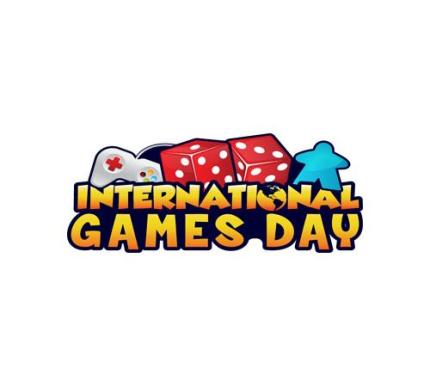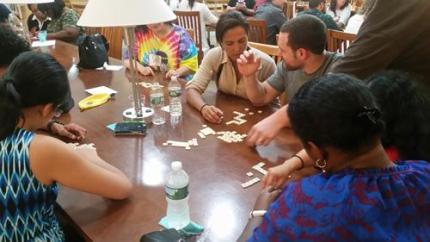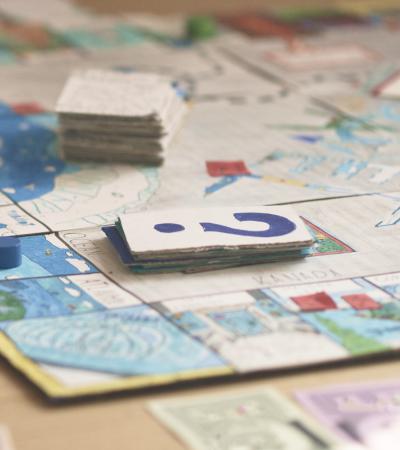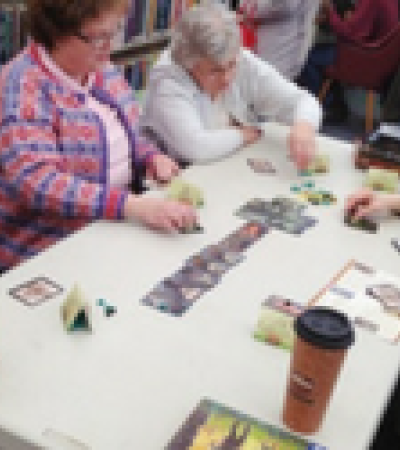Whether you’ve always been a proponent of gaming in the library or were late to the party, games have found their place in adult and teen programming. According to ALA’s Games and Gaming Round Table’s (GameRT) 2016 International Games Week (IGW) report, about 82 percent of public libraries participating already had a collection of either tabletop or console games. Some libraries loan games while others focus on game events. As technology becomes less expensive and community needs shift, we will certainly see continued growth of gaming events in public libraries.

Big business
Not surprisingly, games are big business. Libraries have been experiencing a renaissance in tabletop gaming programs for almost a decade. “Hobby games,” defined by ICV2 (Internal Correspondence, the Business of Geek Culture), are those games produced for a “gamer” market and include collectible games, miniatures (non-collectible), board games, card and dice games, and roleplaying games. Retail sales for 2015-16 in the U.S. and Canada were $1.4 million, which represents 21 percent growth, according to ICV2 #92, fall 2017. Not surprisingly, collectible card games with an app are driving this statistic. "Pokémon GO" was kind of a big deal.
The intermingling of the physical and virtual game is the way of the future, so we can easily expect more of this. Now is the time to consider space and budget to accommodate these technologies as they are released. Most libraries already offer a variety of game programming, including board game nights, console tournaments, VR/AR events, and increasingly creative games such as escape rooms, scavenger hunts and murder mysteries.
Assessment is key
Creating and maintaining a safe, positive and effective teen space can be a difficult task. As a new teen librarian, I have learned to listen closely to the teens and include them in the program planning process. I also can count on the continued advice of many colleagues.
Trevor Oakley, former teen services librarian at Saratoga Springs Public Library (SSPL), held the position for nine years, overseeing the planning and construction of the Teen Room, as well as watching many groups graduate over the years. As technology and trends change rapidly, it is essential to routinely assess game needs.
As obvious as this may sound, things can easily get complicated, as Trevor relays. “In 2012, the original SSPL Teen Room underwent a renovation, which included reducing the number of PCs from six workstations to four. We had been seeing a steady decrease in their use, with laptops, phones and tablets becoming more common. We were not aware that the PC gaming phenomenon 'League of Legends' was taking the world of e-sports by storm, and upon reopening, our desktop PCs were back in demand! We had assessed our tech needs, but only looked at one source of information — our computer use statistics. We didn’t factor in the skyrocketing popularity of ‘League’ and e-sports in general, thus proving that numbers do not tell the entire story!”

It's good for them, it's good for us
Sure, sometimes having a group of rowdy, sugar-fueled adolescents in one space can get hairy. Sometimes I want to ban Monster Energy Drinks from the Teen Room.
However, as a new teen services librarian, I am ecstatic that teens choose to come to the library after school at all. I am not entirely sure I would have chosen to go to the library after school when I was 16. Therefore, I will stretch the budget as far as I can to support gaming in my library. Besides, video games might make you smarter.
ALA’s Gaming Wiki points out that, “Gaming services epitomize library as third place, creating a community gathering spot between home and work/school. That third place encourages play, socialization and cultural enrichment.”
Especially for teens, TechSoup for Libraries argues that gaming can re-establish a relationship between a young adult and the library: “…[T]here’s more and more evidence that games in general and video games in particular develop a wide range of useful skills. Furthermore, gaming events in libraries can generate great publicity, and they create a strong, lasting connection between teens and the one institution in town that actually supports and encourages the activity that they love so much.”
There can be other net positives when it comes to teens and gaming. Trevor recalls how video gaming at SSPL inadvertently created leadership opportunities and fostered general comradery: “Teens began governing themselves in the gaming area. They made the rule that if there is more than one person wanting to use the consoles, the game must be multiplayer, and they enforced it! Without explicitly asking for it, the library was able to provide games that fueled socialization while empowering our teens.”
If you build it, they will come
If your library currently doesn’t have game programming, IGW is a great time to introduce the idea, experiment with games temporarily and gauge the response!
Libraries interested in participating in IGW need only fill out a questionnaire detailing their plans for the event. The only event requirement is to have some sort of game-related activity in or around your library, during or near International Games Week (in 2017, that's this week, October 20 to November 4).
According to ALA’s Games and Gaming Round Table IGW website, “[t]he games can be video games on a library console, tabletop games, social games, party games, traditional folk games — whatever you think will work for your individual library and community.” The site also provides promotional materials, logos and press materials to help you promote the event in your library.
Games and Gaming Round Table resources
- GameRT website
- Free and Low-Cost Tabletop RPG Options
- Free Video Games
- International Games Week
- GSL 80: Games Helping Special Needs Students with Social Skills
- Games and Gaming Resources
- Why Gaming @ Your Library
- I Love Libraries gaming FAQ
Other resources
- Boardgaming.com:This website offers reviews of games as well as information such as playing time, the pieces that come with the game and whether there are any expansions available. It also offers news on tabletop games.
- Board Game Quest: This site offers reviews of a range of types of games, interviews with game creators and top-ten lists about games of various genres.
- Board Game Geek: This is a source of information about a wide variety of board games, card games and tabletop games, including the number of players, forums and links to other media about games.
- YouTube: You can also find video reviews or playthroughs of games on YouTube.




